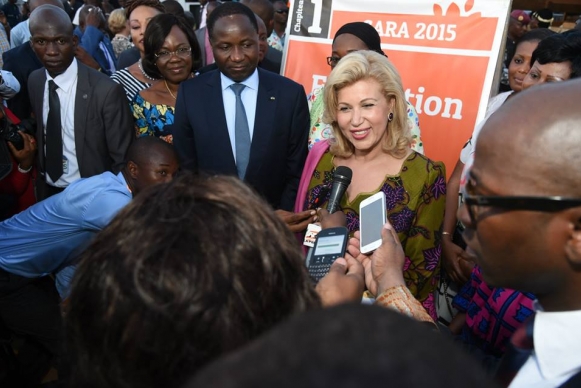You are here
Toutes les actualités
Sara 2015: a very important participation of the CNS
From 3 to 12 April 2015, the third edition of the International Exhibition of Agriculture and Animal Resources of Abidjan (SARA 2015) was held under the authority of President Alassane Ouattara, after the 1997 and 1999 editions, Organized by the Minister of State Lambert Kouassi Konan. 16 years later, SARA's objective was to promote the production, processing and marketing of Ivorian agricultural products in order to attract sustainable investment, as this sector represents more than 30% of GDP and 70% of Export; and Côte d'Ivoire is the world's largest producer of cocoa. Thus, SARA registered 607 exhibitors made up of companies and institutions such as the National Oversight Committee for Fight against Trafficking, Exploitation and Child Labor (CNS), chaired by the First Lady Dominique Ouattara, Which has decided to fight this phenomenon which has intensified since 1998, particularly in the coffee and cocoa plantations, and which has eroded the image of the Ivorian cocoa. As a platform for investment opportunities, SARA is also a meeting place for all players in the agricultural sector, particularly farmers. On this occasion, the CNS held a Local Awareness Booth, which attracted more than 2,000 visitors (Presidents of Institutions, Ministers, actors in the agricultural sector, business leaders, civil servants, students, housewives, pupils) on the national effort to combat trafficking and the worst forms of child labor in key areas, but also distributed information and awareness-raising guides on the phenomenon to more than 4,000 visitors.
In the area of child protection
Improving children's access to education aims to create a protective institutional environment for children to reduce vulnerability factors. That is why, at the end of 2014, Côte d'Ivoire adopted the law making school compulsory for all children aged 6 to 15 years. In the framework of the Presidential Emergency Program (PPU), 750,000 school kits were distributed and 60,000 school tables were provided for the 2013-2014 school year; 100 teaching units were built in 2012, as well as 6,000 classrooms throughout the national territory from 2011 to 2013; 110 primary schools and 223 classrooms were built or renovated; 137 accommodations were built from 2012 to 2014, 32 school canteens built from 2012 to 2014; 10,891 school kits were distributed from 2012 to 2014 and 590 family allowances granted by the Coffee-Cocoa Council and the Chocolate Companies in the cocoa area. Also, for the 2013-2014 school year, the Ministry of Education, with the support of UNICEF, distributed 60,000 school kits, in addition to 6,600 kits distributed by the Children of Africa Foundation, a member of the CNS. Lastly, thanks to the support of the Chocolate Companies, 176 supplementary birth certificates were established for the benefit of children not registered in the civil register.
If the Tulane University Peasant Center for International Development is in the process of obtaining an accurate knowledge of the number of children subject to trafficking and the worst forms of child labor, the overall surveys carried out in most developing countries show that the majority of child victims of this phenomenon work in agriculture particularly.
In the area of improving the living conditions of cocoa producers
Improving the living conditions of cocoa growing communities aims to reduce the risks of using infant labor in cocoa plantations. It is reflected in community development actions. For example, the International Cocoa Initiative (ICI), a member of the CNS, and its partners, with the support of the communities themselves, carried out 1,097 community development actions in 2013. In addition, with a view to increasing the income of producers, the Coffee-Cocoa Council distributed crop protection products and improved seeds to producers. These are 320,000 plant health products; 40,470 hectares of improved cocoa seed; 770,000 hectares of insecticides; 345,000 hectares of fungicides in the 2013-2014 season; 720 cocoa-producing communities supported; 122 drilled holes; 318 hydraulic pumps built in villages; 03 electrified villages and 16 equipped and medical ambulances offered in 2013. Lastly, in 2013, the Chocolate Companies and the Cocoa Organizations realized 617 AGR, built 94 improved village hydraulics and 14 dispensaries. However, all the actions of the National Oversight Committee, the Inter-ministerial Committee (CIM), partners such as the United Nations agencies, non-governmental organizations and the cocoa industry have made it possible for Côte d'Ivoire to be reclassified to a higher level by the US State Department as one of the countries that have made efforts to remove children from this scourge, and more specifically from plantations. Côte d'Ivoire's commitment to significantly eradicate trafficking and the worst forms of child labor has manifested itself through a significant financial effort estimated at more than 9,034,401,073 CFAF over the cumulative period of 2012 and 2013, US $ 18,068,802,146 from the Government. This dynamic will continue and intensify through more specific and refined remedial actions thanks to the exact mapping of the phenomenon which will make it possible to establish the 2013 survey of the University of Tulane on child labor in cocoa plantations in Côte d'Ivoire.
In the meantime, the CNS, headed by the First Lady Dominique Ouattara, increases awareness-raising activities. As during its meeting of awareness and interactions with producers of Cocoa in San Pedro, on 17 May 2014, on Friday 10 April 2015, at the International Exhibition of Agriculture and Animal Resources of Abidjan (SARA) the CNS has sensitized Ivorians and visitors in particular. "For the fight against child labor, you know that my whole Committee is fighting (the National Oversight Committee for Fight against Trafficking, Exploitation and Child Labor, ed.), The Government also, to prevent Children from working in plantations, in domestic places, everywhere. With regard to agriculture, this is the right place to say stop to child labor ".

